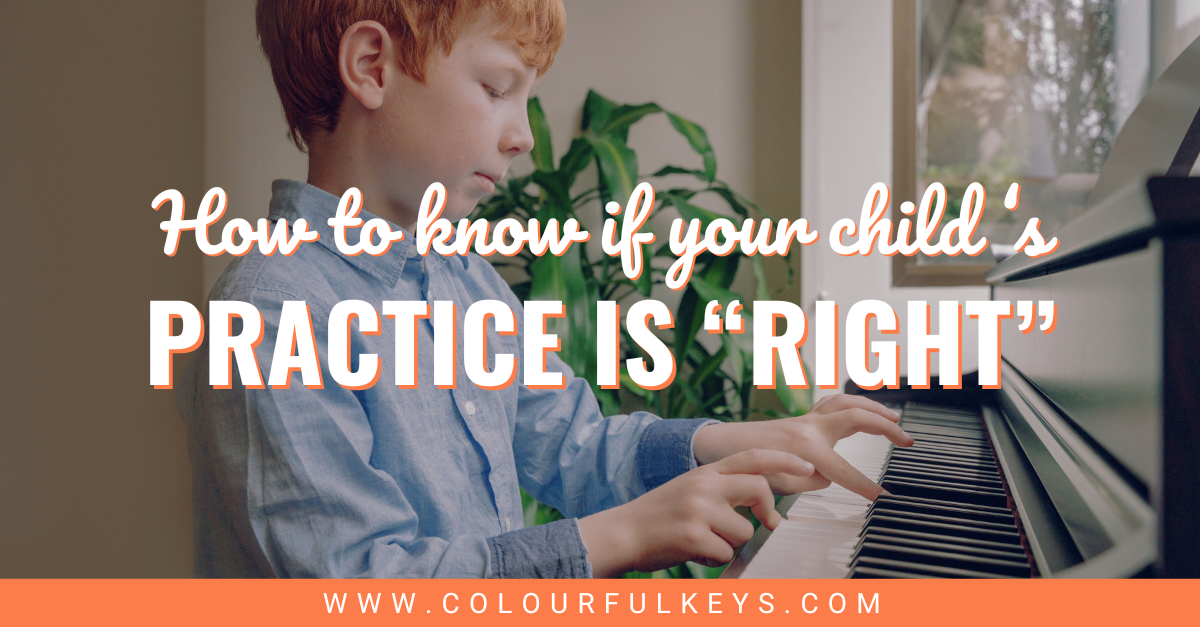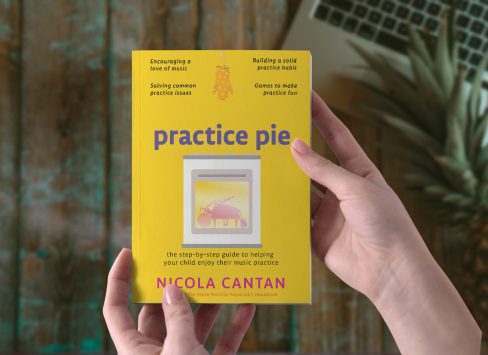Colourful Keys is primarily a blog for music teachers. However, this article is part of a series for PARENTS of music students. If you’re a music parent, read on to learn what your child’s piano practice should sound like. If you’re a teacher, feel free to pass the link to this article on to parents in your studio.
All you have to do is turn on the TV or look at your phone to know times have changed. And just as the world at large has seen huge shifts in the past 10 years or so, the world of piano teaching has changed – including an overhaul of music practice at home.

Regardless of whether you’ve had instrument lessons of your own or you’ve never touched a piece of sheet music, you may feel utterly lost when it comes to determining if your child is practising the “right” way.
Don’t worry. We’ve got you covered.
What does “right” even mean?
As experienced music teachers, we’ve seen almost everything when it comes to practice styles and strategies. We’ve done the research and tried it all out on ourselves and our students.
And while we’re not convinced there is any one specific “right” way to practise, we’ve learned what things generally work and what don’t. We also know with some level of certainty what a parent needs to be looking and listening for when it comes to practice for their musical offspring.
What Practice Should Sound Like
First things first: Your kiddo needs to practise. No amount of effective strategies or quick tips will make the slightest bit of difference if your child isn’t practicing regularly.
In fact, for at least the first 6 months of your child’s musical journey, we don’t recommend using any special strategies at all. The most important thing you can do in the beginning is establish a routine, like we describe in this article of the “music parent” series.
Get your child to their instrument at the same time or same part of the routine every day, and follow your teacher’s instructions for what to practise. If that lasts no more than 5 minutes in the beginning, so be it.
Once that beginning routine is established, it can start to be moulded into something more effective.
Messy
Yep, your child’s home piano practice should NOT be pretty. If you hear loads of mistakes, ad nauseam repeats of miniscule parts of a song and oddities like playing from the end of a piece to the beginning, pat yourself on the back! Your child’s practice is shaping up nicely so far.
It may sound like a lot of chaos, but the path to mastery is a bumpy road. And just as you assume you’ll reach your destination (even though you hit some turbulence along the way), don’t conclude your child isn’t learning and growing just because practice sounds like a hot mess.
Because it’s usually the exact opposite.
If you want more advice about home practice, check out this step-by-step guide to helping your child enjoy their music practice.
It’s a quick read, addressing all those pesky questions you have about your child’s home piano practice (including the questions you don’t know you have!).
Chunky
If your child is truly practising the “right” way, you won’t hear a piece played beautifully from start to finish until it’s been practised in small sections first. In addition, those miniature bits will most likely be played on repeat until mastery is gained.
You’ll also hear tiny segments of a piece played on repeat where your child targets tricky spots in a song. This strategy is actually a scientifically proven approach called “deliberate practice”, and it makes learning any instrument more efficient.
Slow and Steady
When it comes to your child’s sports aspirations, speed is a definite plus. But in the world of instrument practice, speed is an enemy – at least in the beginning it is.
As your child is learning new material, listen to make sure their playing is thoughtful and unhurried. In fact, a lot of the time it should be so slow at first that it barely sounds like music at all. (Yeah, we know that sounds a little ridiculous, but please trust us on this.) Speed is a separate practice element. What we’re going for first is accuracy.
Weird
Depending on the teacher, your child might be armed with several tactics to improve their playing while making practice time a lot more fun. But some of these tricks might seem a bit odd… 🤪
Tell me if any of this sounds familiar:
- There are dice sitting on your piano
- Your child sometimes hums instead of playing anything at all, or you see them wiggle their fingers but hear nothing
- You regularly hear them go from one thing to another and then go back to the first thing and repeat the pattern, all in quick succession
- They’ll play a piece starting at the end or somewhere in the middle
- Your child has asked you for 3 small trinkets they can use to practice with
- Your phone or tablet mysteriously goes missing during practice sessions
Strange as these things may sound, they’re part and parcel of proven methods for effective practice. (No, they’re not just random ways to make your child’s piano practice fun – that’s just an added bonus.) Keeping the brain active and engaged keeps musicians from mindlessly playing through their pieces, which in turn means their practice will be much more effective.
What Practice Should *NOT* Sound Like
If you’re still not sure about your child’s piano practice, you can watch out for these markers indicating less-than-effective or inefficient practice sessions:
- Your child plays their new pieces from beginning to end without stopping or slowing down
- Mistakes might be “fixed” immediately after they’re made, but you don’t hear those trouble spots revisited
- Smooth-as-silk playing of much-loved and polished pieces from the past without any signs of the messy and weird practice described above. (This is called playing the piano, and is the result of the effective practice described above.)
How do you feel about your child’s home music practice?
Feel free to leave your thoughts or questions in the comments section below, and we’ll do our best to help.
For more like this, check out other articles from our “music parent” series:
- How involved should you be in your child’s music practice?
- Why NOT to Teach Your Child Music Staff Mnemonics
- Help Your Child Develop a Solid Music Practice Habit
- Is your child’s piano practice “right”?
- Why is my child’s piano teacher playing games in lessons?
- Why does my child have piano listening assignments?
